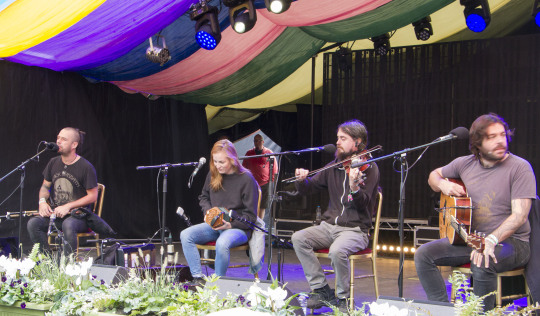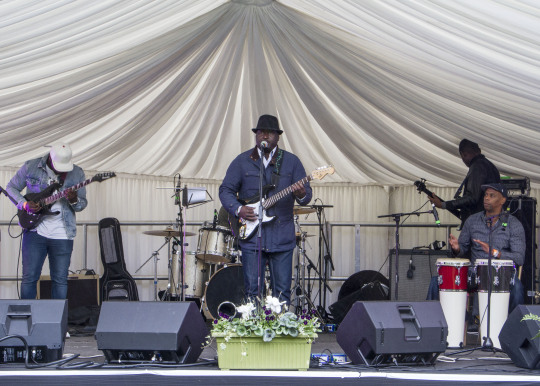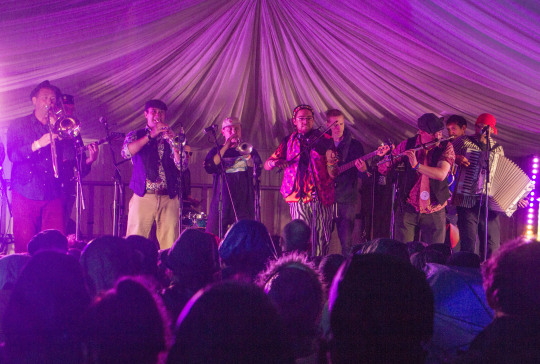#still sees the dead in this verse. his guitar playing can be described as 'haunting'
Explore tagged Tumblr posts
Text
“People get romantic about musicians, apparently,” a voice halts her song. “They say they tend to wear their hearts right along their sleeves. So honest, they tell me. And also so open.”
He enters the studio. The door whispers shut.
Cường, head tucked low – hair overgrown, the front spilled dark and wispy – tosses her his needling gaze. It’s a quality of his, those deep, soul-raking glances, and were Marceline an ocean of dark, hidden depths, well then, Cường was but excavator. Adventurer. Keen. It was likely a mistake to write any song with him, but as he settles in his chair, it’s too late to scurry now. He’ll strip her soul naked. Her song’s filled his skull. “’I’m just your problem',” he recites, taking out his notebook. Hm. “You sounded good. Anyway, they say you can tell someone’s whole story if you listen close enough. Well, if any of that’s true, yours is probably interesting. Song after song with all this yearning and aching... Are we going to write a collab or plan a hospital stay?”
@redemptioninterlude.
#redemptioninterlude#( musician tba. )#a starter...for marceline#i wrote a verse for musician cuong but in short hes a guitarist for the howlers#and does his own work on the side. hes an enigma because hes seldom in the public eye#but when he is hes always curiously a bad ways (bruised and battered because of his lycanthropy...or doped up because#of the drugs he takes to combat the pain.)#still sees the dead in this verse. his guitar playing can be described as 'haunting'#and i hope it was okay referring to one of marceline's canon songs here fkdkk#cuong: damn u full of pining and yearning???? join the club
5 notes
·
View notes
Link
John Prine was an Army veteran walking a U.S. Postal Service beat in Chicago and writing songs on the side when Kris Kristofferson heard him and helped spread the word about Prine’s gifts. Pretty soon, he resigned as a letter carrier; his supervisor snickered, “You’ll be back.” Nearly 50 years later, this January, he was given a lifetime achievement Grammy for his contributions to songwriting. The singing mailman almost always had the last laugh.
Prine, who died on Tuesday from complications of the coronavirus, was legitimately unique. He took familiar blues themes — my baby left me — but filled them with whimsy and kindness. He liked a saucy lyric, and wrote movingly, in character, of the quiet lives and loneliness of humdrum people. He seemed like a Zen sage and offered an uncynical live-and-let-live morality in his songs, writing in a colloquial voice that revealed a love of the way Americans speak. He showed how much humor you could put in a song and still be taken seriously. He had less in common with any other songwriter than he did with Mark Twain.
He grew up in Maywood, a western suburb of Chicago, and was reared by working-class parents from Kentucky, where he often spent summers with relatives and fell in love with country music and bluegrass. By 13, he was performing in rural jamborees. When he debuted in 1971, in his mid-20s, he sounded like an old man already, so years later, when he got old and went through two cancer treatments, he still sounded like himself. From his first to his last, he wrote songs that were tender, hilarious, and wise, without grandstanding any of these traits. Here are 15 of the best.
‘Angel From Montgomery’ (1971)
“Angel From Montgomery,” his best-known song, begins with a little declarative startle: “I am an old woman, named after my mother.” It’s an incisive and terrifying look at the dissatisfactions of a bad marriage and a woman’s sense of being economically trapped in her misery. Bonnie Raitt recorded it three years later and uncovered some of the song’s dormant melodies.
‘Your Flag Decal Won’t Get You Into Heaven Anymore’ (1971)
Prine’s self-titled 1971 debut album is a playlist all its own; it has more great songs than a lot of respected songwriters have in their entire careers. The moral stance of this sprightly folk-rock ditty is a response to what he saw as sham patriotism during the Nixon years, and it remains relevant: “Jesus don’t like killing/No matter what the reason’s for.” Prine, a former altar boy, stopped playing it live for a number of years, but when George W. Bush became president, Prine said, “I thought I’d bring it back.”
‘Hello in There’ (1971)
Some fans and critics are put off by this song and its slightly lesser companion, “Sam Stone,” which they see as performative displays of sensitivity toward the vulnerable, or what we now call virtue signaling. Yet somehow, we don’t ever criticize singers for signaling vices and meanness. Prine sings in the voice of an old married man with a dead son, who spends his days in silence and loneliness, and who at the end of the song, asks people to be kind to the elderly.
‘The Frying Pan’ (1972)
For his second album, “Diamonds in the Rough,” Prine assembled a small, mostly acoustic band and pursued a front-porch, Appalachian simplicity. Like a lot of his songs, this one takes a lighthearted view of domestic complications: A man comes home and discovers his wife has run off with a traveling salesman. He cries miserably, recounts what he loved about her (“I miss the way she used to yell at me/The way she used to cuss and moan”), and full of pride, comes to the wrong conclusion: Never leave your wife at home.
‘Please Don’t Bury Me’ (1973)
For people who love Prine’s music, there’s some small solace in listening to his songs about death, which have the same sense of mischief and acceptance as the ones about broken marriages. (Try “Mexican Home” or “He Was in Heaven Before He Died.”) The narrator is dead, and as angels explain to him how it happened, they also recap his last wish: to not be dropped into a cold grave, but to be put to practical use, as an organ donor: “I’d druther have ’em cut me up/And pass me all around.” A kind of recycling anthem from his terrific third album, “Sweet Revenge.”
‘You Never Can Tell’ (1975)
Almost like an apology, Prine concludes “Sweet Revenge,” a grieving, downhearted album, with an exuberant Chuck Berry cover, one great writer nodding to another. The Memphis R&B guitarist Steve Cropper produced the record and put together a crack horn section, which pushes ahead of some barrelhouse piano. Prine wasn’t a rocker, but he could rock.
‘That’s the Way the World Goes Round’ (1978)
Prine seemed to have an unlimited ability to expand and vary songwriting structures and perspectives. This track, which has been covered by Miranda Lambert and Norah Jones, has two verses: In the first, the narrator describes a drunk who “beats his old lady with a rubber hose,” and in the second, the narrator gets stuck in a frozen bathtub (it’s hard to explain) and imagines the worst until a sudden sun thaws him out. Both verses illustrate the refrain: that’s the way the world goes round. Even when circumstances are bad in Prine songs, he favors optimism and acceptance.
‘Iron Ore Betty’ (1978)
A lot of Prine songs celebrate physical pleasure: food, dancing and sex, which he gallantly prefers to call “making love.” The working-class singer in this soulful, up-tempo shuffle feels unreserved delight at having a girlfriend (“We receive our mail in the same mailbox/And we watch the same TV”), and wants us to know he and Betty aren’t just friends (“I got rug burns on my elbows/She’s got ’em on her knees”). OK guy, we get it.
‘Just Wanna Be With You’ (1980)
A stomping number from “Storm Windows” in the style of Chuck Berry, with the Rolling Stones sideman Wayne Perkins on guitar. Prine’s lyrics don’t distinguish between reality and absurdity — they don’t clash, they mix — and here’s one more way to say you’re happy and in love: “I don’t even care what kind of gum I chew.” And another: “Lonely won’t be lonesome when we get through.”
‘Let’s Talk Dirty in Hawaiian’ (1986)
Prine had a sideline in novelty songs, which give full voice to his comic absurdity, throwaways that are worth saving, including the 1973 semi-hit “Dear Abby,” and this now-problematic number from “German Afternoons” inspired by a paperback book called “Instant Hawaiian.” Prine and his co-writer Fred Koller began making up Hawaiian-sounding nonsense words full of sexual innuendo, and Lloyd Green added airport-Tiki-bar bar steel guitar for maximum faux authenticity. You can say Prine’s loving disposition makes the song OK, and you can also say it doesn’t.
‘All the Best’ (1991)
After five years away, Prine returned with “The Missing Years,” a Grammy-winning album produced by Howie Epstein, Tom Petty’s bass player. The singer in this gentle, masterly miniature claims to want good things for an ex-lover, but feelings aren’t simple: “I wish you don’t do like I do/And never fall in love with someone like you” twists the knife. Now recording for his own label, Oh Boy Records, Prine was about to hit a hot streak.
‘Lake Marie’ (1995)
Bob Dylan, who was a huge fan, called the haunted, mysterious “Lake Marie” his favorite Prine song, and who are we to disagree with Dylan on the topic of songwriting? Even though Epstein’s booming production draws too much attention to itself, “Lost Dogs + Mixed Blessings” is full of winners: the simple, loving ballad “Day is Done,” the rapid-fire doggerel of “We Are the Lonely” and the calm, ornery “Quit Hollerin’ at Me,” where Prine tells his wife that the neighbors “already think my name is ‘Where in the hell you been?’”
‘In Spite of Ourselves’ (1999)
Prine was diagnosed with cancer, and doctors removed a tumor from the right side of his neck, which took away his already-modest ability to project his voice. But incredibly, his stolid singing was now perfect for harmonies, and he cut a duets album called “In Spite of Ourselves” with female country and Americana singers. On its one original song, Prine and Iris DeMent trade backhanded compliments (“She thinks all my jokes are corny/Convict movies make her horny”) that read like a divorce complaint, but turn out to be only pillow talk.
‘Some Humans Ain’t Human’ (2005)
At seven minutes and three seconds, this track from “Fair and Square” is the longest song on any of his studio albums. A cloud of slide guitar keeps this soft waltz afloat and allows Prine to express his disapproval of, if not contempt for, so-called humans who lack empathy for others. There’s a couplet that is clearly about George W. Bush, and Prine noticed that some audience members were surprised by it. “I never tried to rub it in anybody’s face, but I thought it was pretty clear that I wasn’t a closet Republican,” he told the Houston Press.
‘When I Get to Heaven’ (2018)
In 2013, doctors removed the cancerous part of Prine’s left lung, which sidelined and weakened him. It’s hard now to listen to his final album, “The Tree of Forgiveness,” which was nominated for three Grammys, and not think that Prine heard the clock ticking louder. There’s so much tenderness in “Knockin’ on Your Screen Door,” about a man whose family left him with only an 8-track tape of George Jones, and in the elegiac, reassuring parental entreaty “Summer’s End.” In the last song, “When I Get to Heaven,” Prine describes his ideal afterlife: a rock band, a cushy hotel, a girl, a cocktail (“vodka and ginger ale”) and “a cigarette that’s nine miles long.” He removes his watch, and asks, “What are you gonna do with time after you’ve bought the farm?”
1 note
·
View note
Text
Year: 2002 (The Aftermath of 9-11-2001)
Toby Keith – Courtesy of the Red, White and Blue (The Angry American)
www.youtube.com/embed/ruNrdmjcNTc" frameborder="0" allowfullscreen></iframe>
This video is a summary in musical form of the September 11, 2001 terror attack on the U.S. It provides analogy after analogy to explain how the country was before 9-11, what happened, how it happened, how the U.S. citizens felt afterward, what the U.S. response will be, and how the U.S. will respond.
Toby uses the first two versus of the song to state the patriotism of Americans and to thank past military veterans for fighting for our freedom. These versus define the country prior to 9-11. Analogies in these two versus include saluting, recognizing Old Glory, and a lot of men dead so we can sleep in peace.
The third verse explains that the country was attacked by subterfuge in the analogy of “sucker punch flyin’ in from somewhere in the back”. This part of the third verse is used to explain what happened and how it happened on 9-11. The third verse then explains how the U.S. felt afterwards by the use of the “black eye” analogy, and how the U.S. will respond with the analogy of “light up your world like the 4th of July”.
However, all this information is in the form of a rhythmic, rhyming cadence that invokes a patriotic sense of pride in the video’s audience. Most of the key words in the aforementioned analogies are visually illustrated throughout the video.
According to Songfacts, Toby Keith told the CBS show 60 Minutes that he wrote this song in just 20 minutes, a week after 9-11. His intention was to play it for troops on USO tours but not to be part of a commercial release. However, after playing it for Pentagon brass in Washington, the Marine Corp commandant said, according to Keith: "You have to release it. You can serve your country in other ways besides suiting up in combat."
Aaron Tippin – Where the Stars & Stripes & The Eagle Fly
www.youtube.com/embed/TTKmjhJ1__o" frameborder="0" allowfullscreen></iframe>
This video is patriotic and sings the praises of all the basic freedoms and blessings of the citizens of the U.S. Aaron also uses analogies in this song to be able to express his love of this country in his music. Examples include “there’s a lady that stands in a harbor for what we believe” and “a bell that still echoes the price that it cost to be free”.
In the wake of 9-11, he is trying to express patriotism and support of New York and the devastating effects of that day. The whole video is meant as a means to bolster patriotism and to be uplifting of the country as a whole.
The video opens with various views of the city, its residents, well-known structures and the various types of emergency responders from the city, such as firefighters, city police and state police. In the shots of emergency responders, the video zooms in on the various badges and patches of the uniforms. He uses images of citizens with foreign descent to symbolize the “melting pot” of our culture. Examples include Hindus, Asians, Hassidic Jews, and a man wearing a turban.
There are scenes throughout the video showing the Red Cross volunteer workers in various situations. The importance of this is understood after reading the MTV News article regarding the single released of this song, that includes a recording of “You’ve Got to Stand for Something” on the B Side. All the proceeds of the sales of the single were donated to the American Red Cross to aid victims of the terrorist attacks.
Throughout the whole video, the shots of Aaron singing and playing the guitar are always in front of an extremely large U.S. flag. At the very end of the video, a man’s arm is shown with a tattoo partially exposed. The bottom of the tattoo reads “In God We Trust 9-11-01”.
3 Doors Down – When I’m Gone
www.youtube.com/embed/_iXqCvkW1pg" frameborder="0" allowfullscreen></iframe>
This video’s lyrics aren’t obviously related to 9-11 at first glance, but the video illustrates the direct result of that day: the military response. From the beginning of the video to the end, scenes of military deployment, the return of veterans who have been deployed, and military troops in current service, and the military in combat are shown, as well as the effects it has on families of those military members.
Since a deployment requires a military person to leave his/her home, and possibly even the U.S., the meaning of lyrics of the song then become clear in their relationship to 9-11. The men and women in the U.S. military forces need love and support when they are deployed, which was subtly suggested in the lyrics of this song.
Brad Arnold, lead singer, also uses analogies in this song. The first verse discusses “another world inside of me that you may never see” in a compartmentalized fashion, suggesting the civilian life versus the military life. Later in the last verse, he sings “part of me is fighting this but part of me is gone.” This analogy could be interpreted in several ways: his body is in the physical fight, but his mind is somewhere else, maybe home; or that fighting in the war has changed him, and even though he wants to come back home, part of him is gone, since he will never be that same person who left.
According to an interview between Brad and Songfacts, the lyrics don’t have anything to do with war or the military. However, the video was dedicated to all the men and women serving in the U.S. military. The song gained popularity around the time the U.S. was preparing to invade Iraq. For many people in the military, the song said a lot about how they were feeling being away from their families and loved ones, and reminded them that everyone back home was still thinking of them.
Bruce Springsteen – Nothing Man
www.youtube.com/embed/NKYYChoQIvI" frameborder="0" allowfullscreen></iframe>
This video shows scenes from 9-11 throughout the whole video. There are no illustrations of the lyrics at all. Many of the scenes are recognizable from the news coverage of the event. The scenes are not in any specific order, and some are repeated.
The lyrics are written from the viewpoint of a male first responder who witnessed the 9-11 event firsthand. The man is viewed as a hero due to his actions on 9-11, as per the lyrics, “how my brave young life was forever changed”. The misty cloud of pink vapor referred to at the end of the first verse is a reference to the blood spilled. Although others view him as a hero, he does not, which is why he refers to himself as “the nothing man”. According to Rolling Stone Magazine, the song is described as a lush, haunting ballad and seems to give voice to the emptiness and incomprehension felt by some of that day’s surviving heroes.
The event did not change the way that life functions every day, but on the other hand, it changed other things for him dramatically. The lyrics refer to “Friday night club meets at Al’s Barbecue”, which is one example of how the lives around him continue on as though nothing changed or happened. He sees himself as an every-day, normal Joe and nothing special. He is having trouble processing what he witnessed that day, and the song ends with him praying that he is able to continue living, although he considers suicide.
Work Cited
“3 Doors Down Lyrics.” AZLyrics,
www.azlyrics.com/lyrics/3doorsdown/whenimgone.html. Accessed 8 Oct. 2017.
“Aaron Tippin Lyrics.” AZLyrics,
www.azlyrics.com/lyrics/aarontippin/wherethestarsandstripesandeaglefly.html. Accessed 8 Oct. 2017.
Arnold, Brad. Interview by Shawna Ortega. Brad Arnold from 3 Doors Down. Songfacts, Songwriter Interviews,
www.songfacts.com/blog/interviews/brad_arnold_from_3_doors_down/. Accessed 8 Oct. 2017.
“Bruce Springsteen Lyrics.” AZLyrics,
www.azlyrics.com/lyrics/brucespringsteen/nothingman.html. Accessed 8 Oct. 2017.
“Courtesy of the Red, White and Blue (The Angry American).” YouTube, uploaded by TobyKeithVEVO, 16 June 2009, www.youtube.com/watch?v=ruNrdmjcNTc. Accessed 8 Oct. 2017.
Keith, Toby. Songfacts. Toby Keith. www.songfacts.com/detail.php?id=5041. Accessed 8 Oct. 2017.
Loder, Kurt. “Bruce Springsteen: The Rising.” Rolling Stone, Jann Wenner, 30 July 2002, www.rollingstone.com/music/albumreviews/the-rising-20020730. Accessed 8 Oct. 2017.
“Nothing Man.” YouTube, uploaded by Jürgen B., 19 Mar. 2008,
www.youtube.com/watch?v=NKYYChoQIvI. Accessed 8 Oct. 2017.
Orr, Jay. “New Aaron Tippin Song to Benefit Red Cross.” MTV News,
www.mtv.com/news/1448903/new-aaron-tippin-song-to-benefit-red-cross/. Accessed 8 Oct. 2017.
“Toby Keith Lyrics.” AZLyrics, www.azlyrics.com/lyrics/tobykeith/courtesyoftheredwhiteandbluetheangryamerican.html. Accessed 8 Oct. 2017.
“When I’m Gone.” YouTube, uploaded by TheHybridPro1, 5 Oct. 2012, www.youtube.com/watch?v=_iXqCvkW1pg. Accessed 8 Oct. 2017.
“Where the Stars & Stripes & The Eagle Fly.” YouTube, uploaded by Chris Tognan, 12 Sept. 2007, www.youtube.com/watch?v=TTKmjhJ1__o. Accessed 8 Oct. 2017.
0 notes
Text
Moseley Folk Festival
Moseley Park, Birmingham
Sunday 3rd September 2017

For two glorious days, Moseley Park has been bathed in warm sunshine making it possible to believe that this was the start of glorious extended summer, or possibly a better one to compensate for the one we didn’t get in August. The vibrant greens, however, are now duller and flecked with yellow or brown, the paths are strewn with leaves and the earlier sunset brings a chill to the dark nights. By Sunday morning the pretence was over, grey clouds replaced blue skies discharging their content over the dry ground. The warmth of the sun was now hidden and the shorts and t-shirt I had worn for the first two days would no longer keep me warm; needless to say the shades were left at home. The chill of autumn, however, seems appropriate. Sunny optimism was right for Amy Macdonald, the warm glow of nostalgia for Fairport Convention but today we have the icy cold of Laura Marling, just the time for autumn to announce itself.

There are a number reasons why I shouldn’t like Laura Marling. From her aloof detached manner as she takes to the stage she makes it clear we are here on her terms and we should be grateful for the hour or so we spend in her presence. Her one comment as is to say we all look nice in our “macs”, the mocking tone contrasting our soaked and bedraggled selves with the immaculate figure in front of us. She runs through about half a dozen songs from her latest album, “Semper Fermina”, before she says another word. She is momentarily distracted when a member of the audience shouts out a song request but the girl next to me yelling out “you’re a genius” is ignored, and coming when everything else was silent, there is no way she wouldn’t have heard it. The detached manner seems to apply to her band as well, each works in their own space and there is little sense of camaraderie; as it is the last night of the tour she asks them to share something with the audience but it all seems a little forced and inevitably Marling’s own contribution was the least revealing. The long solo acoustic middle part of the set makes the point that whilst it was nice to have them around, they weren’t essential. The rest of the band had left the stage for this and when they return she asks them what they had been up to back there, a little chink perhaps in the armour, without her domineering presence they may actually have had a pretty good time. This aloof manner may well be due to her being very posh; I’m not just talking Genesis public school posh, Marling is the daughter of a Baronet, aristocracy, the gentry that the music of the people has always been against.

For all this, however, I can’t dislike her. The icy cool detachment gives her a presence that is magnetic and she effortlessly holds the attention of the audience. As the applause dies down after each song, there is silence, no background chatter, everyone held in rapt attention as they wait for the next song. The intricate percussion and fluid baseline of “Soothing” immediately grabs the attention and the subtle textures of the music are so absorbing that she doesn’t let go. The latin title of the album, which means “always woman”, is a phrase she picked up from the Roman poet Virgil and she has had it in her mind for about six years until she felt she had the songs to do it justice. These deal with women’s perspectives of women, as close or more distant friends or as rivals. They may or may not be highly personal, Marling’s doesn’t do emotive and the distance between the songs and their emotional context remains a mystery. The “hopeless wanderer” of “Soothing” therefore could refer to her ex Marcus Mumford finding someone else to give him the security he craved and that she was unable to provide. Alternatively, the song could be entirely fictional, the dying friendship approached as a theoretical exercise to discover what it would feel like to be there, real life and music compartmentalised so that the two do not cross.

In less skilled hands, this could be a weakness but Marling makes the ambiguity work and the songs emotional content displays an impressive lived in maturity, particularly so given that she is still only in her mid twenties. There is an underlying sadness in the songs, the friendships were once close but are now over, the good times remembered fondly but the pain of separation means that they will never be found again. The story in “Wild Fire” is of a friend who “Keeps a pen behind her ear; Because she's got something she really really needs to say”; something that one day will be written into a book. Her own self centred nature, however, means that she is only interested what she will say about the “her time spent with me”. Her negligence also informs “Don’t Pass Me By”; a plea for a closeness she knows she cannot give in return. The highlight is “The Valley”; for once showing vulnerability in that she retains the feelings she once had but wonders why the other person wants to keep their friendship in the past; “I know she stayed in town last night; Didn't get in touch; I know she has my number right; She can't face seeing us”. Her calm dispassionate voice serves to bring out the raw emotion of the words and the effect is magical.

Alone with just her guitar, Marling returns to her earlier work with a delicate “What He Wrote”; another almost unbearably sad song illuminated by her delicate playing and a voice that barely rises above a whisper. Her one cover is Townes Van Zandt’s “For The Sake of the Song”, immaculately played and as dark as her own work, but before the band return, she does allow in some light in with the beautiful “Daisy”. Despite the loss and regret in the lyrics, the pace quicker is a little for “How Can I?” but the mood of quiet reflection returns for other songs from previous albums until she concludes with “Rambling Man”, for once the rhythm in the song being allowed to assert itself without being constrained. There was no encore, but then there didn’t need to be, the set had been pretty well perfect as it was and her songs wouldn’t lend themselves to one anyway. Seeing her at Latitude three years ago, she didn’t quite manage to overcome the scale of the largest stage and fond it difficult to draw the audience in. Now, her stage presence is more assured, her oblique and intense songs are some of the best she has written and in front of a smaller audience who were there to listen, she was mesmerising. A wonderful end to the festival.

As a performer, Kate Rusby is pretty much the opposite of the headline; with her roots in Barnsley, she retains a strong Yorkshire accent despite her years in the business and this gives a down to earth demeanour for the story telling that intersperses the songs. As a mother of two children, her husband Damien O’Keane leads the backing band, she is keen to share her experiences of the joys and challenges of parenthood as well as setting the context for the songs. With the late arrival of their bass player, he gets there just as they make their way onto the stage, she sings the first of these unaccompanied as he sets up. “Yorkshire Couple” is the funny and twisted story of Martha and Amos; approaching retirement Amos learns of the unexpected consequences of his repeated infidelities. Rusby encourages the audience to participate in the final repeated line of each verse, something that she will do throughout the set. With the full band in place, the tardy bass player is immediately called upon to provide the percussive introduction to “Benjamin Bowmaneer”’, a traditional song about how the trivial start to a war can eventually consume the whole country. The subtle accompaniment gives a beautifully sparse setting for Rusby’s wonderfully expressive voice which draws out the tender sadness of the song. The sensitivity of her voice is perfect for the longing in songs such as “The Hunter Moon” and “The Ardent Shepherdess” whilst adding a haunting intimacy to “Life in a Paper Boat”, her response to seemingly endless images of refugees crowded onto the boats that they hope will take them to a better life. Searching for answers, she knows that there aren’t any and as a writer with disarming honesty she acknowledges that “all I have is a song”. The highlight, however, is “Who Will Sing Me Lullabies”; a song written a few years ago that works as a heartbreaking response to mothers carrying what look like bundles of rags that turn out to be their dead children. A rich and varied set where her gift for humour faultlessly counters the often harrowing stories in her songs.

With his band Idlewild, Roddy Woomble headlined the festival two years ago where the enthusiasm of the response to their anthems led to the spectacle of a mosh pit at a folk festival. With the band paying the bills, Woomble is now over a decade into a solo career that has seen him recently release his third album. On a dreary late evening with the audience recovering from the hoedown that is always a feature of the Sunday afternoon, this was never going to generate that level of excitement but he does cope with the weather and the distractions to hold a sizeable audience around the stage. With a light country rock setting, his solo work seems more personal than the widescreen anthems of Idlewild although after a while it does all start to sound very similar. Earlier in the day, the line-up included various forms of more traditional folk from the angry punk of Lankum to the soft harmonies of The Furrow Collective. The Destroyers anarchic sound is described in the programme as Balkan Brass but that doesn’t really begin to cover the array of influences they draw on. Their punk infused jazz polka even brings in those waiting by the other stage for the quiet restraint of Laura Marling and the randomly choreographed moves are just about contained by the small Lunar Stage. Earlier in the day, Nifeco Costa was the one of the few African acts this year and his intricate finger picking and melodious jazz formed a bright groove that deserved a sunnier setting.

In the short gap between acts, the organisers took the opportunity to advertise the Beyond the Tracks event that is happening in about two weeks. This seems to have drawn some of the indie pop acts that sometimes find their way onto the Folk Festival line-up, The Coral who played here last year feature on the Saturday, and the effect of this seems to have been to return Moseley more strongly to its folk roots. The result of this was that at first the line-up seemed a little underwhelming, I remember having a conversation with someone on twitter along these lines at the time . In truth, some of this did remain, the Sunday afternoon in particular did drag a little, but the festival still managed to achieve what it always does, reminding me how good the acts are I already knew and introducing me to some new ones. That list then; the five best of the weekend:
John Moreland Courtney Marie Andrews Michael Chapman Laura Marling and in their 50th year it was a privilege to finally see Fairport Convention.

0 notes